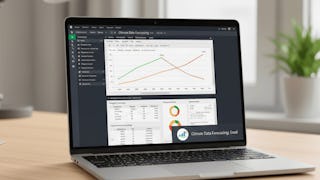By the end of this course, learners will be able to define the fundamentals of forecasting, classify forecasting methods, apply regression and decomposition techniques, and implement advanced models like ARIMA and SARIMA to accurately predict time-dependent data.



Master Time Series Forecasting with R: Analyze & Predict

Instructor: EDUCBA
Access provided by 8 MaI 1945 Guelma University
What you'll learn
Define forecasting fundamentals and classify methods for time-dependent data.
Apply regression, decomposition, and exponential smoothing in R.
Implement ARIMA and SARIMA models with ACF/PACF diagnostics for accuracy.
Skills you'll gain
Details to know

Add to your LinkedIn profile
11 assignments
September 2025
See how employees at top companies are mastering in-demand skills

There are 3 modules in this course
This module introduces learners to the fundamental principles of forecasting within the field of business analytics. It explains the purpose and scope of forecasting, explores different forecasting methods, and highlights common challenges businesses face when predicting future trends. Learners will also gain practical insights into simple forecasting approaches, transformations, and accuracy evaluation techniques, building a strong foundation for advanced forecasting models.
What's included
12 videos4 assignments1 plugin
This module explores how regression techniques and decomposition methods can be applied to time series forecasting. Learners will gain an in-depth understanding of simple, multiple, and non-linear regression, the use of predictors and lagged variables, and the unique considerations of time series regression. The module also introduces decomposition approaches to separate time series into trend, seasonal, cyclical, and irregular components, helping learners build accurate and interpretable forecasting models in R.
What's included
12 videos4 assignments
This module focuses on advanced time series forecasting techniques, including exponential smoothing, ARIMA, and Seasonal ARIMA models. Learners will explore the theoretical foundations and practical applications of autoregressive and moving average models, understand the role of ACF and PACF in model selection, and learn how to handle seasonal and non-seasonal time series data. By mastering these advanced methods, learners will be able to build robust and accurate forecasting models in R that address both short-term fluctuations and long-term seasonal trends.
What's included
8 videos3 assignments
Why people choose Coursera for their career









